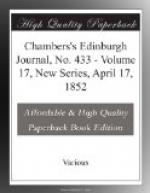’With these calls to industry in our ears, we are not to be deaf to the deep saying of Lord Brooke, the friend of Sidney, that some men overbuild their nature with books. The motion of our thoughts is impeded by too heavy a burden; and the mind, like the body, is strengthened more by the warmth of exercise than of clothes. When Buffon and Hogarth pronounced genius to be nothing but labour and patience, they forgot history and themselves. The instinct must be in the mind, and the fire be ready to fall. Toil alone would not have produced the Paradise Lost or the Principia. The born dwarf never grows to the middle size. Rousseau tells a story of a painter’s servant, who resolved to be the rival or the conqueror of his master. He abandoned his livery to live by his pencil; but instead of the Louvre, he stopped at a sign-post. Mere learning is only a compiler, and does with the pen what the compositor does with the type: each sets up a book with the hand. Stone-masons collected the dome of St Paul’s, but Wren hung it in air.’
There is, perhaps, nothing very profound or original in this, but it is all very sensible and pleasant. Something of novelty, however, will be observed in the extract which follows next, on ’The Influence of Air and Situation on the Thoughts.’ The consideration, at anyrate, is curious, both under its physiological and metaphysical aspect.
’It has been a subject of ingenious speculation if country or weather may be said to cherish or check intellectual growth. Jeremy Collier considered that the understanding needs a kind climate for its health, and that a reader of nice observation might ascertain from the book in what latitude, season, or circumstances, it had been written. The opponents are powerful. Reynolds ridiculed the notion of thoughts shooting forth with greater vigour at the summer solstice or the equinox; Johnson called it a fantastic foppery.
’The atmospheric theory is as old as Homer. Its laureate is Montesquieu. The more northerly you go, he said, the sterner the man grows. You must scorch a Muscovite to make him feel. Gray was a convert. One of the prose hints for his noble fragment of a didactic poem runs thus: “It is the proper work of education and government united, to redress the faults that arise from the soil and air.” Berkeley entertained the same feeling. Writing to Pope from Leghorn, and alluding to some half-formed design he had heard him mention of visiting Italy, he continues: “What might we not expect from a muse that sings so well in the bleak climate of England, if she felt the same warm sun, and breathed the same air with Virgil and Horace?”




